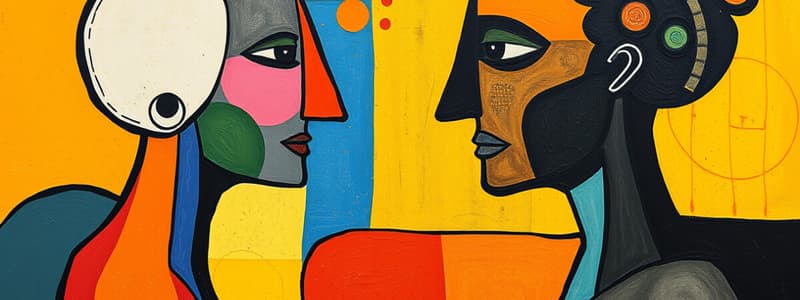Podcast
Questions and Answers
What is Social Imagination according to C. Wright Mills?
What is Social Imagination according to C. Wright Mills?
- A micro-level theory that looks at everyday behavior.
- The consciousness of being an American and a Negro.
- The ability to see connection between personal experience and the largest forces of history. (correct)
- The ability to understand social phenomena through intuition.
What does Verstehen, as defined by Max Weber, entail?
What does Verstehen, as defined by Max Weber, entail?
Understanding social phenomena through empathy and context.
Verstehen refers to understanding the meaning of action from the actor's _____ perspective.
Verstehen refers to understanding the meaning of action from the actor's _____ perspective.
point of view
Double Consciousness describes the sensation of having a unified identity.
Double Consciousness describes the sensation of having a unified identity.
Who first explored the concept of Double Consciousness?
Who first explored the concept of Double Consciousness?
Conflict Theory, suggested by Karl Marx, claims that society is in a state of perpetual conflict due to what reason?
Conflict Theory, suggested by Karl Marx, claims that society is in a state of perpetual conflict due to what reason?
What is Feminist Theory a response to?
What is Feminist Theory a response to?
Symbolic Interaction Theory focuses on macro-level dynamics.
Symbolic Interaction Theory focuses on macro-level dynamics.
What characterizes Post-modernism Theory?
What characterizes Post-modernism Theory?
What does Conflict Theory posit as the basic force of social change?
What does Conflict Theory posit as the basic force of social change?
Flashcards
Social Imagination
Social Imagination
The ability to understand how individual experiences are shaped by larger social forces and historical context.
Verstehen
Verstehen
A method for understanding social phenomena through empathy and contextualization, focusing on the intended actions and backgrounds of individuals.
Double Consciousness
Double Consciousness
The internal conflict of simultaneously holding and navigating two disparate identities, often resulting from social pressures and conflicting societal perceptions.
Conflict Theory
Conflict Theory
Signup and view all the flashcards
Feminist Theory
Feminist Theory
Signup and view all the flashcards
Symbolic Interaction Theory
Symbolic Interaction Theory
Signup and view all the flashcards
Post-Modernism Theory
Post-Modernism Theory
Signup and view all the flashcards
Study Notes
Social Imagination
- C. Wright Mills developed the concept of social imagination, highlighting the connection between personal experiences and broader historical forces.
- It suggests that individuals may have a distorted view of their social position in daily life.
Verstehen
- Max Weber introduced the term "Verstehen," emphasizing the understanding of social phenomena through empathy and context.
- It involves grasping the intended actions of individuals and their backgrounds, moving beyond mere intuition to systematic and empirical research.
- Verstehen challenges positivistic approaches in social science, advocating for a subjective perspective on actors rather than treating them as mere objects.
Double Consciousness
- W.E.B. Du Bois coined the term "double consciousness," describing the internal conflict of having dual identities, such as being both "an American" and "a Negro."
- This concept encompasses the struggle to reconcile two disparate identities, reflecting strain from conflicting ideals and societal perceptions.
Conflict Theory
- Originated by Karl Marx, conflict theory posits that society experiences ongoing conflict due to competition over limited resources.
- It argues that social order is maintained through power dynamics and domination rather than consensus.
- Conflict is viewed as a fundamental force driving social change and development.
Feminist Theory
- Emerging from the women’s rights movements of the 1960s and 1970s, feminist theory examines the subordination of women in sociology and society.
- It aligns with elements of Marxist theory, focusing on conflict and pursuing political reform.
- Feminism encompasses diverse theories centered around women's experiences and challenges.
Symbolic Interaction Theory
- This micro-level theory emphasizes that shared meanings, orientations, and assumptions motivate human actions.
- Individuals interpret experiences differently based on personal histories, leading to varied perceptions even in identical situations.
Post-modernism Theory
- Post-modernism critiques traditional notions of progress and history, suggesting a fragmented approach to identities and experiences.
- It recognizes multiple identities that can be inconsistent and result from varied social affiliations rather than linear narratives.
Studying That Suits You
Use AI to generate personalized quizzes and flashcards to suit your learning preferences.




